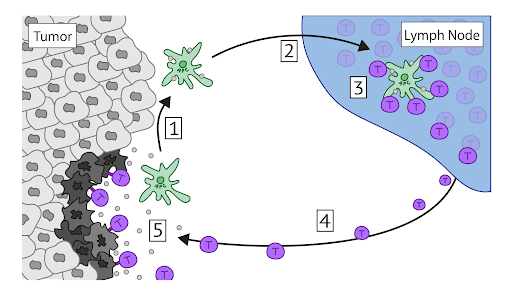From negotiating property prices to blind-guessing the result of a long multiplication, the previous exposure to certain data can greatly influence our choices and decisions. This phenomenon, first theorized by Amos Tversky and Daniel Kahneman, is called anchoring: a cognitive bias where a particular reference point or 'anchor' influences an individual's decisions. This exposure to a value and its influence in decision making plays a big role in both the scientific community where anchoring could introduce a human bias into research, as well as in day-to-day life where the existence of anchors could be a powerful tool in marketing, economic decisions, or negotiations.
Press Release: The Body's Built-in Cancer-Fighting System
The battle with finding a cure for cancer has been long and arduous, given that it is a unique disease arising from a random change in genetic material. However, in recent years we have come to realize that our body has all the machinery needed to fight cancer on its own, but a few key players, monocytes and macrocytes, prevent our body from eradicating cancer cells. The review paper published in the October issue of the Journal of Young Investigators analyzes how the immune cells monocytes and macrophages affect tumor cell growth as well as how we are combating this issue.
Monocytes and Macrophages in the Cancer Immunity Cycle
Monocytes and macrophages are two developmentally related immune cell types that can infiltrate tumors of cancer patients. These cells critically impact cancer progression due to their abilities to both induce and suppress the body’s natural anti-cancer immune response. Since these cell types can directly hinder the efficacy of immunotherapy treatments, identifying strategies to inactivate and inhibit their functions is of great therapeutic interest. In this review, we discuss how monocyte and macrophage populations contribute to the cancer immunity cycle, a cycle which specifically targets cancer cells while keeping healthy cells unharmed. Specifically, our review focuses on the roles of these cells in the blood (circulating monocytes), tumor tissue (tumor-resident macrophages and monocyte-derived dendritic cells), as well as lymph nodes (lymph node-resident macrophages). We discuss how these cells can promote cancer growth and can participate in the immune attack against cancer through the secretion of cytokines, thereby aiding or harming the immune response. We highlight how certain migrating macrophage populations can take up tumor antigens and travel to the lymph node to activate T cells to begin the killing of tumor cells—a role that is usually thought to be fulfilled by only dendritic cells. Lastly, this review highlights why monocytes and macrophages are promising targets for treating cancer, and how these cells can be reprogrammed to improve patient responses to existing therapies, termed immunotherapies, that act to enhance the body’s natural anti-cancer defenses.



